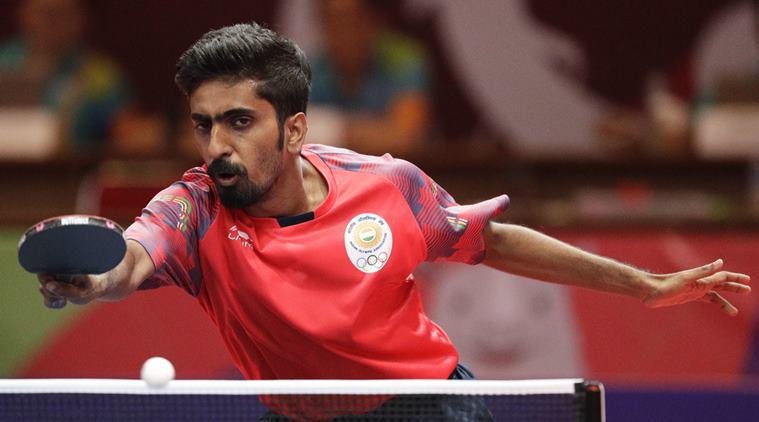 India lost to Korea 3-0 in the semifinals to win a bronze. (Source: AP)
India lost to Korea 3-0 in the semifinals to win a bronze. (Source: AP)
Gnanasekaran Sathiyan bursts out laughing. He’s just been reminded that the ply he uses on his table tennis racquet is named after a Japanese player, Jun Mizutani. It’s a piece of equipment he has used to win a World Tour event and three medals (a gold, silver and bronze each) at the recent Commonwealth Games at Gold Coast. The breakthrough medal though came on Monday, when he used that same racquet to win two singles matches against Japanese opposition to earn India its first ever medal at an Asian Games – bronze in the men’s team event.
“Yeah, now that I think about it, it’s pretty amazing,” he says.
It’s a historic achievement for table tennis in the country, for no Indian has won a medal at the Asiads since the sport was added to the roster at the 1958 Games (held in Japan). For the bronze though, the underdog Indians were to play the world’s third best team.
Granted Japan has travelled to Jakarta with its second-string team, Kenta Matsudaira (ranked 19th), Jin Ueda (28) and Masaki Yoshida (57). But India still needed to punch above its weight to get an unexpected win. They did just that, but it wasn’t as simple as just going out to the JIExpo Hall and playing a match. Smart tactics played a part in beating the Japanese.Normally, India’s highest ranked player, world No. 33 Achanta Sharath Kamal would have started the team event with a match against Japan’s second player Ueda, followed by Sathiyan playing their top player Matsudaira.
An hour before the tie could commence though, Kamal offered a change during the team meeting. “I decided to play the second match against Kenta and send Sathiyan first,” says the 36-year-old. “I’ve played him a few times and always won. So Kenta would have some pressure playing against me. Since we had a 2-1 lead and Sathiyan had to play the fourth match, Kenta was under a lot of pressure and that worked well for us.”
The 3-1 win (Harmeet Desai lost out to Yoshida in the third rubber) ensured a bronze medal for India, who lost the semi-final against a strong South Korean lineup. What mattered though was breaking the duck at the Asiad. “Tour events happen all the time, even the World Championships happen every year. But this is once every four years,” says Sathiyan. “At the Commonwealth Games we’re still expected to win because only a few good teams play. But here we are the underdogs. This medal is second only to the Olympics.”
As big an upset and feat the win is, success for the Indians on the global stage was on the cards. Over the last few years, the team has improved significantly especially after the men’s squad has been training and competing in professional leagues in Europe. Both Sathiyan and Kamal play in the German Bundesliga. It helped the team return home with medals at the Commonwealth Games, and then finish 13th at the World Team Championships – the first top 15 finish in three decades – by beating heavyweights France. “They’re playing and training with top players all the time while they’re with the clubs,” former national champion and assistant national coach Arup Basak told The Indian Express after the Commonwealth Games. “So when they face those same players in tour events, they aren’t awe-struck.”
It’s also been crucial for the Indian team that the squad has been consistent in the past few years. Along with Kamal and Sathiyan, Harmeet Desai and Anthony Amalraj have been a constant in the lineup, allowing the chance to build a strong rapport within the group. That itself gives the veteran Kamal, an experienced tactician, the chance to make changes whenever required. Just as he did on Monday against the Japanese.
The win in an event nobody expected them to medal in has put a spring in their step, especially with the singles and doubles events to follow in the coming days. “In the last few months we’ve beaten France and now Japan. That’s two of the top 10 countries,” says Sathiyan. “We need to start getting used to winning because that’s the position we want to be in. That’s where we are going.”
The loss to the Koreans hasn’t dented their spirits, for it is the win against Japan that has pushed their morale to a level they’ve never known before at the Asian Games. It’s a historic win, and there’s more work yet to do. But Kamal can afford a few light moments for now. He too laughs when he’s told about the ply Sathiyan uses. For himself, he’s switched onto a new ply by a new company that will soon start marketing in India. “Maybe they’ll call it the Sharath Kamal ply.”